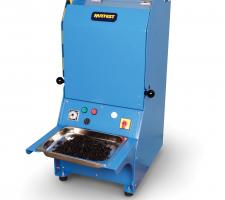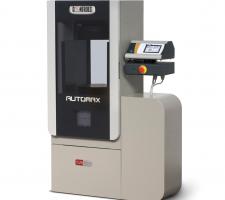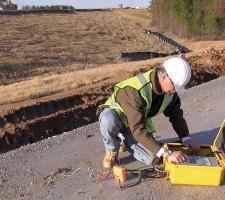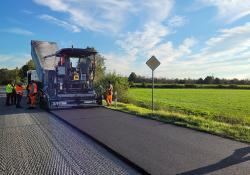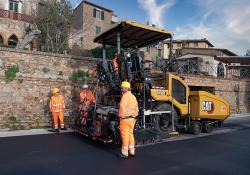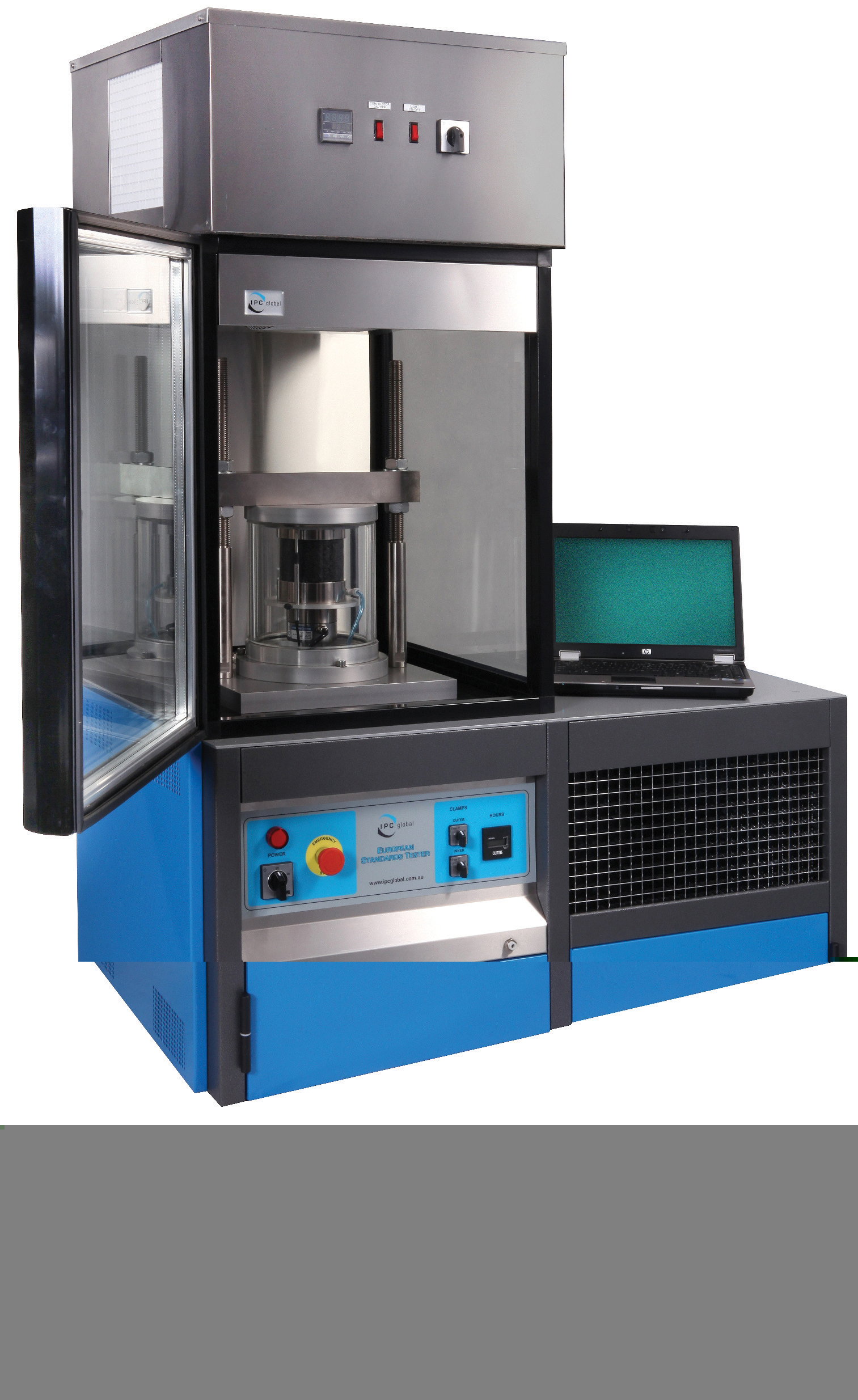
IPC Global’s modular system can be used to carry out a range of different tests
From density tests on a Mongolian gold mine project to an all-singing, all-dancing asphalt tester, Kristina Smith reports on some of the latest new products in materials testing
Perhaps understandably, nuclear density gauges can present contractors with some order to move them at all.“One of the problems with nuclear soil gauges is the restrictions on movement,” said John Lamond, Manufacturing. “If you are a contractor projects cross-border, it’s a real challenge to move a nuclear density gauge around.”
An Electrical Density Gauge (EDG) has no such restrictions. “With an EDG you can take it on a plane, anywhere, it makes things a lot easier to manage,” said Lamond.
The latest model of
In Mongolia, Humboldt’s EDG was used on the US$6.2 billion first phase of the Oyu Tolgoi Mining Site, a copper and gold mine and the country’s biggest ever project. Local company Soil Trade took over 1,000 readings on compacted ground for a variety of structures including roads.
It has taken 15 years of development to reach the current model of EDG, the Humboldt H-4114SD.3F, which was launched in March last year and has since sold almost 300 units. Its predecessor, the H-4114C.3F, which was commercially available from June 2008, sold 600 units. Humboldt achieved
In order to carry out the test, the technician drives four darts into the compacted ground, available in five lengths depending on the depth of the layer being tested. The EDG uses high radio frequency waves which travel between the darts to measure the dielectric properties and moisture levels of the compacted soil.
Before taking any measurements, the user must upload soil model data into the machine and Proctor test data if it is to be used to measure compaction as well as moisture Operated by touchscreen or touchpad, GPS and Bluetooth technology to aid with the validation and transfer of data.
Humboldt compared the time taken to conduct tests using this machine with a nuclear density gauge and the traditional sand cone method. It came in at 2 minutes 30 seconds, compared to 3 minutes 45 seconds for the nuclear test and 4 minutes 24 seconds on site plus additional lab time for the sand cone.
Meanwhile
Following on from IPC’s EN Standards Tester, launched last year, its Asphalt Standards Tester offers flexibility and adaptability with the ability to be customised for any special market requirement, according to IPC Global’s sales and marketing manager Ling Zhong.
“The EN Standards Tester was a great product and we had initially designed it with a focus on conducted EN standards. However this restricted its market potential and customers from other regions wanted the same but specific to their regional standards,” said Zhong. “Seeing the wider possibilities, we decided we wanted to have a system that could do all of the most common international standards.”
Customers can buy the base system and add individual test modules as required, or as budget allows. The Asphalt Standards Tester has test modules for: four point bend tests; trapezoidal two point bend tests; semi-circular bend tests; indirect tensile tests; dynamic modulus tests; tension compression/ complex modulus tests; overlay tests; compression tests; and cyclic compression triaxial tests.
The machine’s servohydraulic design provides the dynamic testing and comes available with an environmental chamber allowing tests at controlled temperatures from 0° to 60°C. IPC Global’s Integrated Multi-Axis Control System (IMACS) and UTS Software deliver accurate, reliable and meaningful test data, according to the manufacturer.
IPC expects the Asphalt Standards Tester to be popular for any research organisation looking to conduct a wide range of tests. “The Asphalt Standards Tester will be more suited to those customers who may not have the full budget for a large capacity universal testing machine as well as customers who are just beginning to set up their pavement or asphalt research labs,” said Zhong. “In general I think this product will have worldwide appeal, however it may be more attractive to emerging markets such as Africa and some parts of Asia.”
Materials testing specialist
The splitter should also lead to greater efficiency, as breaking specimens down will take less time, and allow laboratory technicians to do other things. The machine has a timer so will stop automatically.
Matest expects to sell the Asphalt Splitter to laboratories around the world. “Matest is growing in terms of our worldwide presence,” said marketing manager Paola Maestroni. “We are almost in every country in the world. “In the past, Europe was a strong market for us. Now we have forged good relationships with other parts of the world. The newest areas are definitely African countries. We are also getting stronger in Middle Eastern areas, where the economy is growing.”
Maestroni also highlighted Asia and North and South America as strong markets for the firm.
Bauma 2013 saw the unveiling of
“Customers can start with a basic investment in a machine, and later upgrade to a more sophisticated model,” said Controls Group’s commercial director Flavio Galli.
The Automax Classic is a fully automatic unit for testing compressive and flexural strength of construction materials. Automax E-Modulus also performs loading and unloading cycles to determine the elastic modulus of construction materials.
The Automax Multitest includes an extra channel which makes it possible to plot the complete load-displacement diagram (or stress-strain) and measure sample toughness, total deformation capacity or energy absorption. Tests on materials such as fibre reinforced concrete or sprayed concrete might require these parameters.
Bauma 2013 was also a chance for Controls to introduce its paving-focussed division, Pavelab Systems, to the world. “The launch of Pavelab Systems is a clear indication to the end user that we have the technology and the expertise,” said Galli. “It’s not just the machines, it’s the team of experts behind the machines. If our client has a problem, they call us and ask us for a solution, and with all our knowledge of both EN and ASSHTO standards, we can help them.”
Controls launched Pavelab Systems in October at the same time that it unveiled five new asphalt testing machines. Already it has sold the new machines to clients in China, Mexico, Spain, Holland, Germany, Turkey and Iraq.
Materials testing equipment manufacturer
Windows XP-based, the Touchtronic is basically a small PC. “It has all the powerful function of a standard PC,” said Tecnotest engineer Andrea Nardelli, “and the speed and technical specification of a PC.” The PC can be connected to a company’s computer network which means that a laboratory manager can view tests remotely from another part of the building.
Currently Touchtronic, which is available with four or eight channels, has been developed for Tecnotest’s compression testing machines. The next step will be to introduce it for soil testing machines, which is planned by the end of the year. Asphalt machines will follow.

